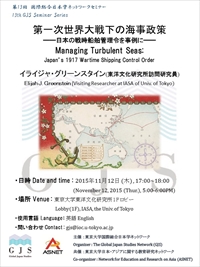Speaker: Elijah J. Greenstein (Visiting Researcher at IASA of Univ. of Tokyo)
Date and time: November 12, 2015 (Thur.), 5:00-6:00PM
Venue: Lobby(1F), Institute for Advanced Studies on Asia, The University of Tokyo
Language: English
Abstract:
The First World War created unprecedented opportunities for Japanese shipping. German ships were detained in foreign ports or bottled up in home waters by the British navy, while London diverted the British Empire’s massive merchant marine to the war trade. Severe shortages of tonnage resulted, and as charter and freight rates soared, Japanese shipowners dispatched ships around the world in pursuit of profits. As those ships were increasingly chartered out to foreign states and businesses, however, undelivered cargo accumulated in Japan’s ports. In order to adjust the distribution of Japanese tonnage, the government issued the Wartime Shipping Control Order in September 1917, through which the Ministry of Communications asserted wide-ranging authority over charters, freight rates, and voyages. This presentation takes that shipping control order as a starting point from which to explore the significance of WWI for Japan’s shipping industry.
Organizer: The Global Japan Studies Network (GJS)
Co-organizer: Network for Education and Research on Asia (ASNET)
Contact: gjs[at]ioc.u-tokyo.ac.jp
http://gjs.ioc.u-tokyo.ac.jp/en/events/post/20151112_gjs_seminar/

